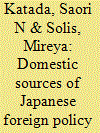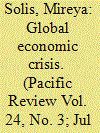| Srl | Item |
| 1 |
ID:
093860


|
|
|
|
|
| Publication |
2010.
|
| Summary/Abstract |
The conventional view in the field of international political economy - that greater economic interdependence creates an incentive for active foreign policy engagement - is hard to reconcile with Japan's foreign economic policy. To explain this counterintuitive outcome, we develop a new model of domestic demand for policy activism that integrates strands of prospect theory, collective action, and interest aggregation. We argue that both the rationale for mobilization and lobbying capacity are essential elements in understanding the domestic demand for significant foreign policy departures. We apply this conceptual framework to Japanese foreign economic policy in two issue areas: finance (Japan's response to the 1980s Latin American debt crisis and the late 1990s Asian Financial Crisis), and trade (Japan's Free Trade Agreement negotiations with Mexico and South Korea).
|
|
|
|
|
|
|
|
|
|
|
|
|
|
|
|
| 2 |
ID:
106005


|
|
|
|
|
| Publication |
2011.
|
| Summary/Abstract |
Political economists have long noted that the prospects for trade liberalization diminish in a climate of economic recession. A stagnant economy intensifies the burden of adjustment for non-competitive sectors and polarizes domestic trade politics. Not surprisingly, the global financial crisis has raised concerns of a substantial protectionist backlash, through the imposition of national measures that circumvent WTO disciplines such as anti-dumping or tied stimulus packages. The impact of economic crisis on regional integration is, however, more ambiguous and has not been explored systematically. On the one hand, policymakers may be pressed to renege on trade liberalization commitments on all fronts - also weakening the momentum to negotiate or implement free trade agreements (FTAs). On the other hand, policymakers may be tempted to 'insulate' their region from adverse global trends and may see FTAs as more amenable to political manipulation that shelters inefficient sectors. In order to shed light on the connection between external crisis and regionalist drive, this article assesses three main challenges East Asian elites confront in devising a regional trade bloc capable of acting as a growth locomotive: institutional fit, multilateralization, and architectural design. The track record of East Asian governments of negotiating FTAs to score diplomatic points abroad and ensure political survival at home - at the expense of maximizing economic gains through far-reaching liberalization - does not bode well for the magnitude of this challenge.
|
|
|
|
|
|
|
|
|
|
|
|
|
|
|
|